BrainyPapers
Welcome to BrainyPapers Your destination for premium study documents that ignite your academic journey. Dive into a treasure trove of meticulously crafted notes, guides, and resources to ace your exams and excel in your studies.
- 849
- 0
- 19
Community
- Followers
- Following
869 items

AQA A-level Biology paper 1 Questions and Answers Graded A+
large molecules often contain carbon. why? they can readily form bonds with other carbon atoms. this forms a 'backbone'. other atoms can then attach. describe benedicts test for reducing sugars add equal volumes of the sugar sample and benedicts reagent. heat the mixture in a water bath for 5 minutes. brick red precipitate will form. what is a reducing sugar? a sugar that can reduce (give electrons to) another chemical. describe the benedicts test for non reducing sugars with food sampl...
- Package deal
- Exam (elaborations)
- • 33 pages •
large molecules often contain carbon. why? they can readily form bonds with other carbon atoms. this forms a 'backbone'. other atoms can then attach. describe benedicts test for reducing sugars add equal volumes of the sugar sample and benedicts reagent. heat the mixture in a water bath for 5 minutes. brick red precipitate will form. what is a reducing sugar? a sugar that can reduce (give electrons to) another chemical. describe the benedicts test for non reducing sugars with food sampl...
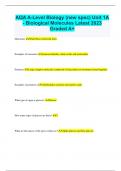
AQA A-Level Biology (new spec) Unit 1A - Biological Molecules Latest 2023 Graded A+
Monomers Small basic molecular units Examples of monomers monosaccharides, amino acids and nucleotides Polymers Large complex molecules composed of long chains of monomers joined together Examples of polymers Carbohydrates, proteins and nucleic acids What type of sugar is glucose? Hexose How many types of glucose are there? 2 What are the names of the types of glucose? Alpha-glucose and beta-glucose Structure of Alpha Glucose Structure of Beta Glucose Are the types of glucose isomers?...
- Package deal
- Exam (elaborations)
- • 13 pages •
Monomers Small basic molecular units Examples of monomers monosaccharides, amino acids and nucleotides Polymers Large complex molecules composed of long chains of monomers joined together Examples of polymers Carbohydrates, proteins and nucleic acids What type of sugar is glucose? Hexose How many types of glucose are there? 2 What are the names of the types of glucose? Alpha-glucose and beta-glucose Structure of Alpha Glucose Structure of Beta Glucose Are the types of glucose isomers?...
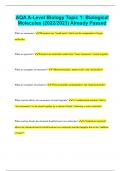
AQA A-Level Biology Topic 1: Biological Molecules (2022/2023) Already Passed
What are monomers? Monomers are *small units* which are the components of larger molecules. What are polymers? Polymers are molecules made from *many monomers* joined together. What are examples of monomers? *Monosaccharides, amino acids* and *nucleotides* What are examples of polymers? *Polysaccharides, polypeptides* and *polynucleotides* What reaction allows two monomers to bond together? A *condensation reaction* allows *two monomers* to be joined together by a chemical bond, *releasing...
- Package deal
- Exam (elaborations)
- • 25 pages •
What are monomers? Monomers are *small units* which are the components of larger molecules. What are polymers? Polymers are molecules made from *many monomers* joined together. What are examples of monomers? *Monosaccharides, amino acids* and *nucleotides* What are examples of polymers? *Polysaccharides, polypeptides* and *polynucleotides* What reaction allows two monomers to bond together? A *condensation reaction* allows *two monomers* to be joined together by a chemical bond, *releasing...
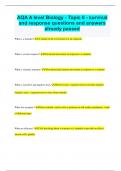
AQA A level Biology - Topic 6 - survival and response questions and answers already passed
What is a stimulus? A change in the environment of an organism What is a tactic response? Directional movement in response to a stimulus What is a kinetic response? Non directional random movement in response to a stimulus What is a positive and negative taxis? Positive taxis- organism moves towards stimulus Negative taxis - organism moves away from stimulus What Are receptors? Detect stimuli- can be cells or proteins on cell surface membrane , loads of different types What are effectors?...
- Package deal
- Exam (elaborations)
- • 43 pages •
What is a stimulus? A change in the environment of an organism What is a tactic response? Directional movement in response to a stimulus What is a kinetic response? Non directional random movement in response to a stimulus What is a positive and negative taxis? Positive taxis- organism moves towards stimulus Negative taxis - organism moves away from stimulus What Are receptors? Detect stimuli- can be cells or proteins on cell surface membrane , loads of different types What are effectors?...
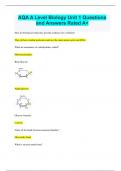
AQA A Level Biology Unit 1 Questions and Answers Rated A+
How do biological molecules provide evidence for evolution? They all have similar molecules and use the same amino acids and DNA. What are monomers of carbohydrates called? Monosaccharides. Beta Glucose Alpha glucose Glucose formula C₆H₁₂O₆ Name of the bond between monosaccharides? Glycosidic bond. What is sucrose made from? Glucose and fruct
- Package deal
- Exam (elaborations)
- • 10 pages •
How do biological molecules provide evidence for evolution? They all have similar molecules and use the same amino acids and DNA. What are monomers of carbohydrates called? Monosaccharides. Beta Glucose Alpha glucose Glucose formula C₆H₁₂O₆ Name of the bond between monosaccharides? Glycosidic bond. What is sucrose made from? Glucose and fruct
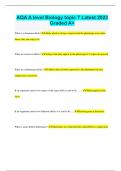
AQA A level Biology topic 7 Latest 2023 Graded A+
What is a dominant allele? Allele which is always expressed in the phenotype even when theres only one copy of it What are recessive alleles? Alleges that only appear in the phenotype if 2 copies are present What are codominant alleles? Alleles that are both expressed in the phenotype because neither one is recessive If an organism carries two copies of the same allele it said to be ........ Homozygous at the locus If an organism carries two different alleles it is said to be...... Hetero...
- Package deal
- Exam (elaborations)
- • 16 pages •
What is a dominant allele? Allele which is always expressed in the phenotype even when theres only one copy of it What are recessive alleles? Alleges that only appear in the phenotype if 2 copies are present What are codominant alleles? Alleles that are both expressed in the phenotype because neither one is recessive If an organism carries two copies of the same allele it said to be ........ Homozygous at the locus If an organism carries two different alleles it is said to be...... Hetero...
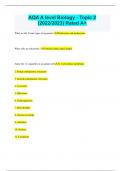
AQA A level Biology - Topic 2 (2022/2023) Rated A+
What are the 2 main types of organism? Eukaryotes and prokaryotes What cells are eukaryotic? Animal, plant, algal, fungal Name the 11 organelles in an animal cell 1. Cell surface membrane 2. Rough endoplasmic reticulum 3. Smooth endoplasmic reticulum 4. Lysosome 5. Ribosome 6. Golgi apparatus 7. Mitochondria 8. Nuclear envelope 9, nucleolus 10. Nucleus 11. Cytoplasm
- Package deal
- Exam (elaborations)
- • 32 pages •
What are the 2 main types of organism? Eukaryotes and prokaryotes What cells are eukaryotic? Animal, plant, algal, fungal Name the 11 organelles in an animal cell 1. Cell surface membrane 2. Rough endoplasmic reticulum 3. Smooth endoplasmic reticulum 4. Lysosome 5. Ribosome 6. Golgi apparatus 7. Mitochondria 8. Nuclear envelope 9, nucleolus 10. Nucleus 11. Cytoplasm
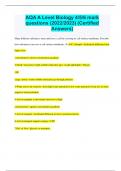
AQA A Level Biology 4/5/6 mark questions (2022/2023) (Certified Answers)
Many different substances enter and leave a cell by crossing its cell surface membrane. Describe how substances can cross a cell surface membrane. (5) 1 (Simple / facilitated) diffusion from high to low concentration / down concentration gradient; 2 Small / non-polar / lipid-soluble molecules pass via phospholipids / bilayer; OR Large / polar / water-soluble molecules go through proteins; 3 Water moves by osmosis / from high water potential to low water potential / from less to more nega...
- Package deal
- Exam (elaborations)
- • 33 pages •
Many different substances enter and leave a cell by crossing its cell surface membrane. Describe how substances can cross a cell surface membrane. (5) 1 (Simple / facilitated) diffusion from high to low concentration / down concentration gradient; 2 Small / non-polar / lipid-soluble molecules pass via phospholipids / bilayer; OR Large / polar / water-soluble molecules go through proteins; 3 Water moves by osmosis / from high water potential to low water potential / from less to more nega...
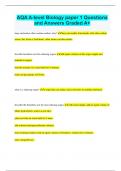
AQA A-level Biology paper 1 Questions and Answers Graded A+
large molecules often contain carbon. why? they can readily form bonds with other carbon atoms. this forms a 'backbone'. other atoms can then attach. describe benedicts test for reducing sugars add equal volumes of the sugar sample and benedicts reagent. heat the mixture in a water bath for 5 minutes. brick red precipitate will form. what is a reducing sugar? a sugar that can reduce (give electrons to) another chemical. describe the benedicts test for non reducing sugars with food sampl...
- Package deal
- Exam (elaborations)
- • 33 pages •
large molecules often contain carbon. why? they can readily form bonds with other carbon atoms. this forms a 'backbone'. other atoms can then attach. describe benedicts test for reducing sugars add equal volumes of the sugar sample and benedicts reagent. heat the mixture in a water bath for 5 minutes. brick red precipitate will form. what is a reducing sugar? a sugar that can reduce (give electrons to) another chemical. describe the benedicts test for non reducing sugars with food sampl...
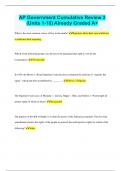
AP Government Cumulative Review 2 (Units 1-10) Already Graded A+
What is the most common source of bias in the media? Reporters allow their own worldview to influence their reporting. Which of the following groups was the last to be guaranteed the right to vote by the Constitution? 18-year-olds In 1954, the Brown v. Board Supreme Court decision overturned the doctrine of "separate but equal," which had been established by ________. Plessy v. Ferguson The Supreme Court cases of Miranda v. Arizona, Mapp v. Ohio, and Gideon v. Wainwright all protect rig...
- Package deal
- Exam (elaborations)
- • 9 pages •
What is the most common source of bias in the media? Reporters allow their own worldview to influence their reporting. Which of the following groups was the last to be guaranteed the right to vote by the Constitution? 18-year-olds In 1954, the Brown v. Board Supreme Court decision overturned the doctrine of "separate but equal," which had been established by ________. Plessy v. Ferguson The Supreme Court cases of Miranda v. Arizona, Mapp v. Ohio, and Gideon v. Wainwright all protect rig...
